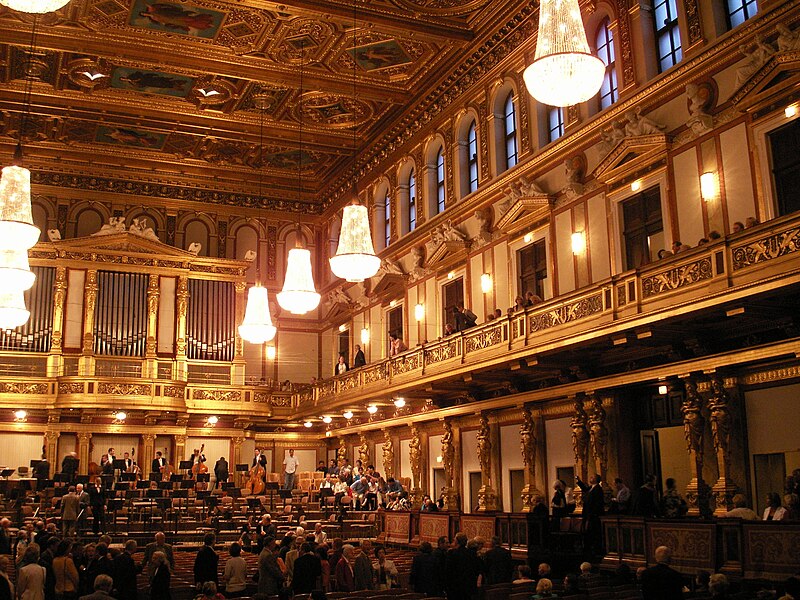 |
| Musikverein Vienna, Golden Hall
Source Wikipedia
|
Television over the New Year used to be decked out with tartan, accordions, Scottish country dancing and Glaswegian comics. That tradition seems to have waned even in Scotland with a new emphasis on fireworks and fun fairs. Probably a good thing as Hogmanay was often accompanied by excessive drinking which must have placed an enormous strain on traffic patrols and the National Health Service. Nowadays the world wakes up for the annual New Year's Day concert from Vienna.
Not everyone enjoys that concert. Writing in The Spectator Norman Lebrecht described the concert as "an annual jellybox of waltzes, polkas, galops, marches and any old tritsch-trash" in "The Nazi origins of the Vienna Phil’s New Year’s Day concert". He described the music as "strictly bar-room, written by members of the Strauss family as social foreplay for the soldiery and serving classes in low taverns."
I am afraid that I do not agree with him.
Great orchestras are allowed to let their hair down once in a while. On Thursday I attended The Hallé's Abba concert where the orchestra including the conductor appeared in big hair wigs and 1970s costumes to act as a backing group for largely inaudible singers attempting to belt out Dancing Queen and Fernando to an audience of swaying sexuagenarians. If I were unkind I could have described the experience as akin to listening to a tribute band in a retirement home, but I won't because it was still good fun and everyone including yours truly had a great time. The Strauss family are at least the artistic equals to Abba and for my part I greatly prefer them.
Mr Labrecht's main concern lies in the origins of the concert:
"The tradition, however, is decidedly pernicious. This concert came into being as a gift to Nazi criminals, a cover for genocide. The Vienna Philharmonic was quick to sack Jewish and leftist musicians when Hitler came to town. More than a dozen were sent to concentration camps; seven of them perished. The orchestra unanimously endorsed the Anschluss with Germany, exhorted by the conductor Karl Böhm to declare ‘a 100 per cent “yes”’, and proved a willing executioner of cultural cleansing, removing Mahler and other giants from its walls and histories."He complains of the exclusion and under representation of women and non-white musicians in the orchestra:
"The orchestra has, until recently, excluded women. One of the perverse pleasures of watching the New Year’s Day broadcast is to count how few females are permitted to take part. The orchestra has just seven women members out of a roll call of 130, the lowest in any 21st-century symphony orchestra."True but that was also a criticism that could be levelled at many British institutions including a well known watering hole in Fleet Street frequented by journalists and out of work barristers for many years. He concludes:
"So long as appearance defeats substance — so long as the world oohs and ahhs at the musical sweetmeats and ignores the dirt in the kitchen, New Year’s Day from Vienna will remain a family favourite, a testament to our human ability to look the other way."With all respect to Mr Lebrecht, I rather hope it does.
Anschluss was reversed over 70 years ago. There was pretty thorough de-Nazification by the allies who partitioned Austria for a while immediately after the end of the war. Very few if any of the players could have been born during the second world war. Modern Austria is our democratic partner in major international and European institutions including the United Nations which was celebrated by Robert Stolz's UNO March, the first piece in yesterday's programme.
The Vienna Philharmonic is raising money for asylum seekers. Next year's concert is to be conducted by Gustavo Dudamel of the Simon Bolivar Orchestra. Sorry but I want to hear that concert. Indeed, if I could spare the time and money I would rather like to be in Vienna this time next year.
Before reading Mr Lebrecht's article I had intended to write about the ballet sequences which were performed by dancers of the Vienna State Ballet (Wiener Staatsballett). There were only two of them this year - one danced at the Prater race track and the other at the Schönbrunn Palace. Not surprisingly, these are the bits of the TV transmission that I like most. I enjoyed both pieces very much and I wish I could find out the names of the dancers and choreographer in order to congratulate them. I can, however, report that the company is directed by Manuel Legris who was one of the stars of the Paris Opera Ballet, that the company is dancing Ashton's La Fille mal gardée until 20 Jan 2016 and that it has some lovely works in its current repertoire and that some of those performances are streamed live over the internet.
Vienna's connection with the ballet is often overlooked but it was the birthplace of Ludwig Minkus who gave us La Bayadère and Don Quixote (see More Thoughts on Don Quixote 20 Oct 2013). It is also the setting for Lichine's charming Graduation Ball which I really wish someone would revive.

No comments:
Post a Comment